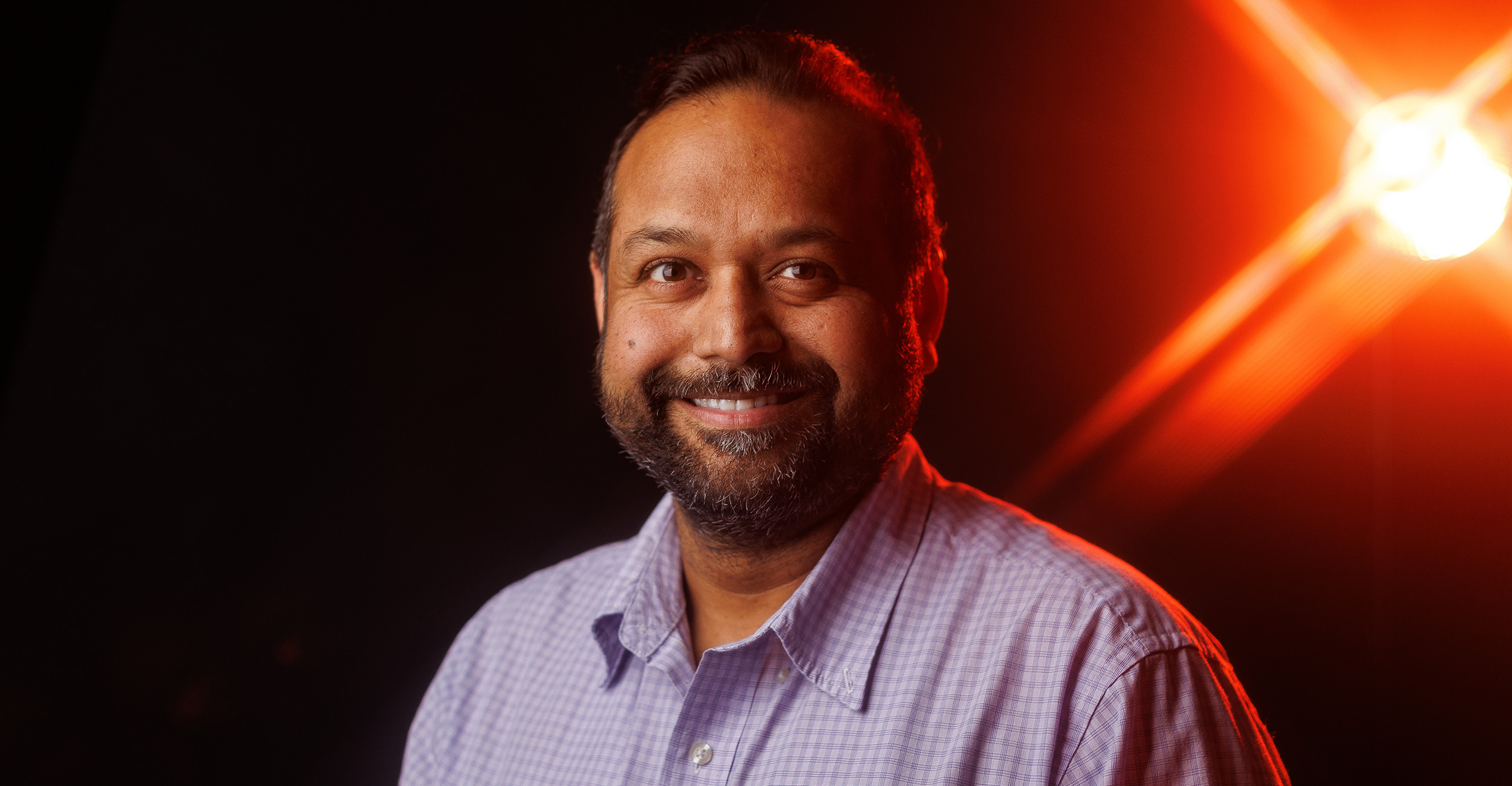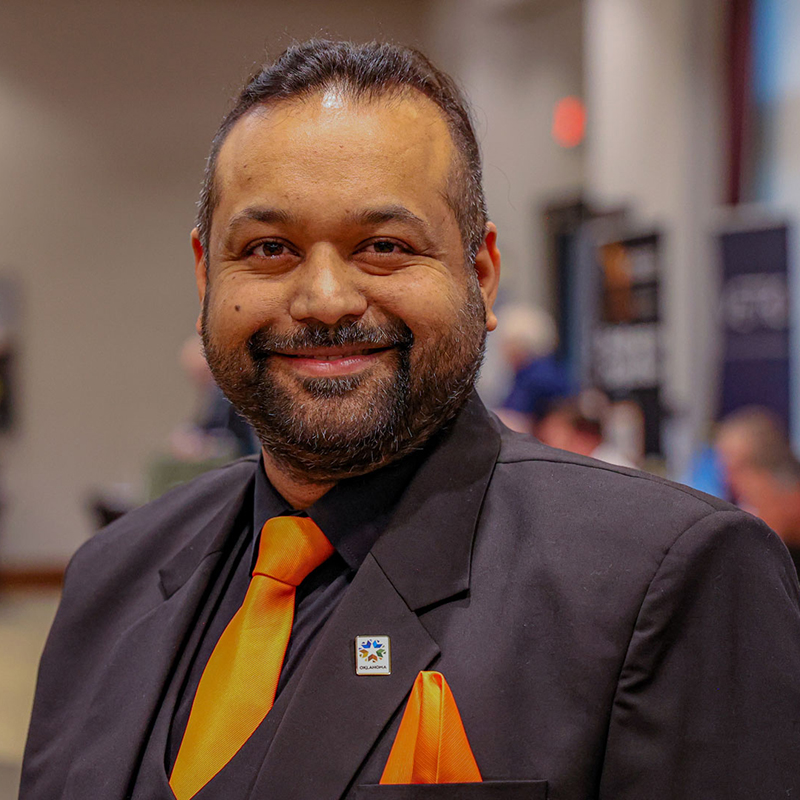
Strength in connection: OSU graduate Gupta selected for 10th class of Presidential Leadership Scholars
Monday, February 3, 2025
Media Contact: Hallie Hart | Communications Coordinator | 405-744-1050 | hallie.hart@okstate.edu
Sachin Gupta understands the stress of suddenly losing an internet connection during a critical moment, and he strives to ease that anxiety for others.
Gupta, a two-time Oklahoma State University graduate, had a 20-minute online interview in November for a coveted slot in the national Presidential Leadership Scholars (PLS) program, but he couldn’t rely on the stable connection at his Stillwater home.
“I was at a conference in Indiana at the time, so I was at my hotel,” Gupta said. “And right at about the 15-minute mark, my internet went out.”
It was an ironic predicament for a telecommunications professional, but Gupta didn’t need to worry whether he had done enough to impress his interviewers.
He successfully conveyed the deeper meaning of his technical work, earning a spot as one of 57 members of the 10th annual PLS cohort. He is the first from Oklahoma since the program's inception, which spans from Jan. 29 until June with support from the foundations of former U.S. Presidents Lyndon B. Johnson, George H.W. Bush, Bill Clinton and George W. Bush.
Gupta, vice president of business and technology strategies at Centranet, is on a mission to increase access to high-speed internet across Oklahoma, therefore building and strengthening connections among people.
As he works to find innovative solutions, the tagline on his LinkedIn profile sums up his business philosophy.
“Technical problems are easy. People problems are interesting.”
At OSU, Gupta learned how to solve both.
Building a career

Gupta obtained a graduate degree in mechanical engineering from the College of Engineering, Architecture and Technology before earning a second master’s degree in telecommunications management from the Spears School of Business in 2004.
“It essentially prepared me to become this mix of somebody who is technologically oriented but can also talk to people and manage people and be able to work on real-world problems,” Gupta said.
He leans on this experience as he expands high-speed internet access with a focus on rural communities and Oklahoma tribal nations. While visiting small Oklahoma towns, Gupta has seen the “digital divide,” which refers to disparities between populations that have reliable internet connections and those that do not.
“When you talk about closing the digital divide, you have to obviously close it by providing access,” Gupta said. “But even if you provided people with access, would they be able to afford it? That affordability piece will only get solved if you get them jobs that are high-paying, and high-paying jobs today are in the high-tech industry. It’s all connected to each other.”
Gupta’s career path began when he earned his undergraduate degree in mechanical engineering from Dayalbagh Educational Institute in Agra, India, his home city of more than two million people and a famed architectural marvel: the Taj Mahal.
He had no clue he would end up visiting places like Agra, Oklahoma, where the latest census-recorded population of 311 could comfortably fit inside OSU’s Student Union Theater. In October 2024, Centranet connected a rural Sac and Fox Nation home in the town of Agra to the fastest residential internet speed.
Gupta needed time to discover his passion for technology-based outreach.
After he studied mechanical engineering at OSU, his Spears Business degree prepared him for a successful entry into business development, sales and marketing, and he spent about 17 years working for defense contractor FLIR Systems.
Gupta had a stable job that allowed him to travel to 32 countries. He enjoyed a comfortable life with his wife and kids in Stillwater, where he welcomed the leisurely pace compared to the hustle and bustle he once knew.
Then, during the height of the COVID-19 pandemic, as Gupta sat at home, he couldn’t help but wonder if something was missing. He started thinking about his purpose in the world, deciding he wanted to dedicate himself to an impactful cause.
“It essentially prepared me to become this mix of somebody who is technologically
oriented but can also talk to people and manage people and be able to work on real-world
problems."
Impacting Oklahoma
Gupta noticed how Zoom meetings and virtual classes created possibilities for many, but rural communities often struggled to keep up with cities.
He could use the unique blend of skills he sharpened in CEAT and Spears Business to address this problem. In 2021, Gupta accepted a position with Central Rural Electric Cooperative, and a theme emerged as he visited towns much smaller than Stillwater.
"I could see the pain in the eyes of these mayors and city administrators who looked at their cities and said, ‘We are slowly becoming ghost towns as kids grow up and leave because we do not have infrastructure here; we do not have access to high-speed internet,’” Gupta said. “The kids leave because even if they can get good jobs, they do not see a future unless they can connect to other people.”
In many ways, internet access has become essential for interacting with the world. Although Gupta could troubleshoot his technical difficulties during his PLS interview, not everyone has the access or training to overcome those issues without major inconveniences.
Kids without Wi-Fi at home scramble to finish online homework in fast food parking lots. Elderly people suffer from preventable health problems without access to telemedicine. Real-life stories such as these troubled Gupta, motivating him to provide sustainable solutions with Centranet, a subsidiary of CREC in Stillwater.
His partnership with Oklahoma tribal nations involves two major components: bringing high-speed fiber-optic internet to Native American communities and training tribal citizens to work as fiber optic technicians. This opens the door to lucrative jobs in which tribal citizens can serve their communities.
“We want to make sure that people understand the value of connecting a house to fiber optics,” Gupta said. “The other piece of that is to make sure that tribal members who are living on these tribal lands can have access to digital opportunities.”
Becoming a leader
Gupta balances several leadership roles that support his initiatives. He serves as the NRECA representative on the Federal Communications Commission’s Technological Advisory Council, a board member of the Fiber Broadband Association, a board director of the American Association for Public Broadband and a member of the Innovation and Business Opportunity Committee for NTCA - The Rural Broadband Association.
In each setting, Gupta builds upon the lessons he learned as an OSU student.
“You have to really know people,” Gupta said. “Sometimes, your technical projects will not move forward unless you have a consensus of a large group of people. The MSTM program really did a good job in teaching me that, and since then, I’ve honed that skill.”
OSU, like Gupta, has evolved to keep up with high-tech industry trends.
CEAT offers a master’s degree in engineering and technology management. Instead of continuing to administer the MSTM program, Spears Business has updated its curriculum since Gupta’s college years to feature several technology-oriented degree programs in the Department of Management Science and Information Systems, including a new undergraduate major in data analytics. Additionally, the Watson Graduate School of Management’s master’s in business analytics and data science (MS BAnDS) program is ranked No. 2 in the nation by Fortune.
Distinguished alumni like Gupta not only reflect the value of an OSU education, but also reinforce the Spears Business "Power of Personal" motto. Bringing his expertise in business and engineering to the PLS cohort, Gupta strives to broaden his perspective as he meets leaders from a variety of industries. It’s a new opportunity to connect with people, and Gupta admires a quality that bonds his fellow honorees.
“The leaders PLS selects are all holistically looking at making the world a better place to live in,” Gupta said. “They’re not looking for self-elevation. They’re looking for something that will help others. I am looking forward to meeting and learning from them.”
